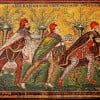Was Jesus raised in a ‘poor’ family?
It is fascinating to see the way that traditions have grown up around the celebration of Christmas, and how many of those traditions are not merely absent from the Bible, but in fact contradict not only the content of the Bible, but the heart of its message. Somehow, where the birth narratives in Scripture are all about something amazing that God has done, these Christmas traditions become moralistic tales about what we need to do.
As a result, the central message of the incarnation (and therefore of the Christmas season), that God has come to us, and this demands a response on our part to him (of repentance and faith) ends up becoming a morality tale. Instead of responding urgently to the coming of his kingdom into our lives, we just need to try harder and make some new New Year’s resolutions. It is, in effect, a secularising of the message.
And these traditions are very hard to dislodge! Traditional understanding has a deep grip on us—and this means we are deeply resistant to hearing the real challenge of God ‘tabernacling amongst us’ in the person of Jesus.
I therefore continue to seek to debunk these mythical traditions. One of the most deeply engrained is that Jesus was, unlike us, born as a poor boy into a poor family, so that we should feel sorry both for him and for the poor people around us. (Note that this message is addressed only to the comparatively wealthy!). This is a long read, but I hope you find it worthwhile, since it seeks to debunk not just this tradition about Christmas, but also a series of unrealistic and inattentive readings of the life of Jesus in the gospels.
Enjoy! (And if you enjoy, share it…!)






























